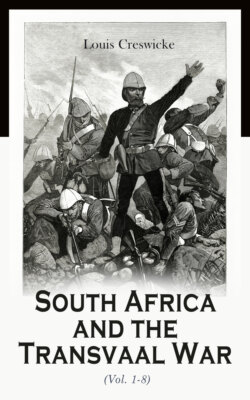Читать книгу South Africa and the Transvaal War (Vol. 1-8) - Louis Creswicke - Страница 11
На сайте Литреса книга снята с продажи.
TRANSVAAL DISSENSIONS
ОглавлениеTable of Contents
Among other things an attempt was made on the part of the Boers to annex the Orange Free State. President Pretorius crossed the Vaal in 1857, at the head of a large commando, with the intention of seizing on the neighbouring territory. He was doomed to disappointment, however, for his intended raid was stopped by the timely resistance of the forewarned President of the Orange Free State. An encounter was happily avoided through the intervention of Mr. Kruger, and finally the two Republics decided to mutually recognise each other's independent States.
But the ambitions of Pretorius merely smouldered. He still kept a greedy eye on the Orange Free State, and machinated for the union of the two States into a gigantic whole. He therefore refused the Presidency of the Transvaal for that of the Free State, in the hope of gathering into his own hands the reins of both governments. He was again disappointed, however, and in 1864 he returned and was re-elected President of the Transvaal.
The return of Pretorius was the signal for temporary peace. During his second Presidency, however, the little rift within the lute—the rift of insolvency, which eventually wrecked South African independence—began to be observable.
Mr. Nixon, who took great pains to acquaint himself with the true state of the country, says "that the intestine disturbances and the incessant Kaffir wars had well-nigh exhausted the finances of the Republic. The exchequer was only tardily replenished under a loose system of taxation. The Boers have never been good taxpayers, and no Government has been able to enforce the proper payment of taxes due to the State. A decade after its establishment the Republic was practically insolvent. Even as early as 1857 the Government was compelled to issue mandaten, or bills, wherewith to raise money to buy ammunition, and to pay its servants. In 1866 a regular issue of paper money was sanctioned by the Volksraad. This was followed by further issues, until, in 1867, a Finance Commission found that there were more notes in circulation than had been authorised by the Volksraad. Nevertheless, the financial requirements of the State became so pressing that still more issues had to be made, and in 1870 there were over £73,000 worth of notes in circulation. The notes were declared a legal tender, but the Government were unable to keep up their value by artificial methods. They fell to a low ebb, and passed from hand to hand at a discount of about 75 per cent, from their nominal value."
In 1867 occurred two events which served to change the whole political and financial outlook of the Transvaal. Diamonds were discovered in the district of Kimberley. Gold was unearthed in Lydenburg. From that hour a procession of European miners began slowly to march north from the Cape. A highway was opened up between the two promising districts, and diggers of every race, pioneers bent on the propagation of modern ideas, teachers, missionaries, and traders of all kinds, attracted by the promise of wealth, flocked to the scene and settled themselves among the trekkers.
